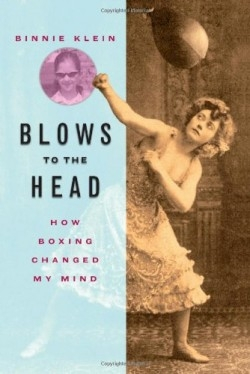Blows to the Head
How Boxing Changed My Mind
For those who’ve never ventured into a boxing gym, the sport can sometimes seem the brutal, mysterious realm of grizzled trainers and hardened athletes. In that light, the image of a middle-aged female Jewish psychotherapist tying on her boxing gloves is not only incongruous, but almost amusing.
That delighted tone permeates Binnie Klein’s memoir of her boxing obsession, as she details her experience with the sport. She admits from the start that she’s an unconventional boxer, but she certainly has the passion the sport requires.
After only a few sessions, she begins to feel a connection to her body that she never thought possible. She writes, “[I]t’s utterly new to feel my power, hear the propulsive sound of my own grunts, and experience such a delight in making this kind of physical contact. My body is bringing me joy.”
But it’s not just the physicality that draws her to train more-boxing requires discipline and focus, which she hones. The sport has an additional unexpected effect for Klein as well: it unlocks memories and insights from her childhood and teen years.
She recalls sitting at her father’s feet as he watched boxing on TV. The matches seemed horrible to her, with their primitive, scary violence, and she feels similarly about her father. “He is a rager, and because his moodiness frightens me as a child, I can’t be very patient or empathetic to his struggles,” she writes. But he’s fascinating to her as well, and as the two wrangle, she learns a bit of psychological bob-and-weave.
Mixed in with these threads of memory are descriptions of the gym, her trainers, and the progression from learning boxing to actually getting in the ring. Much like the sport itself, these passages are lean and strong, and convey the allure of pushing a body and mind past their usual limits.
She doesn’t hold back from considerable self-reflection, but it never seems self-indulgent, only pensive. Boxing isn’t a way to recapture youth, but rather, for Klein, it becomes a method of dealing with aging, connecting to her body, and discovering an entirely new world-one composed of spit buckets and hand wraps-that she didn’t think she’d be exploring. (January) Elizabeth Millard
Disclosure: This article is not an endorsement, but a review. The publisher of this book provided free copies of the book to have their book reviewed by a professional reviewer. No fee was paid by the publisher for this review. Foreword Reviews only recommends books that we love. Foreword Magazine, Inc. is disclosing this in accordance with the Federal Trade Commission’s 16 CFR, Part 255.

